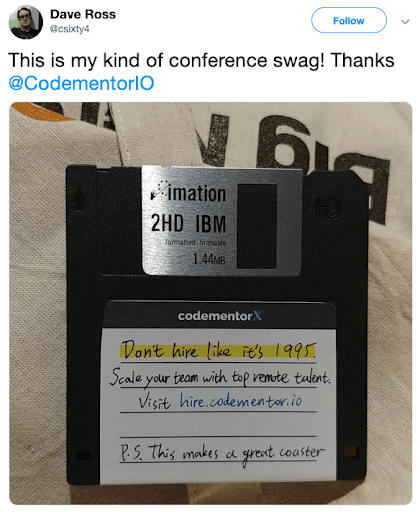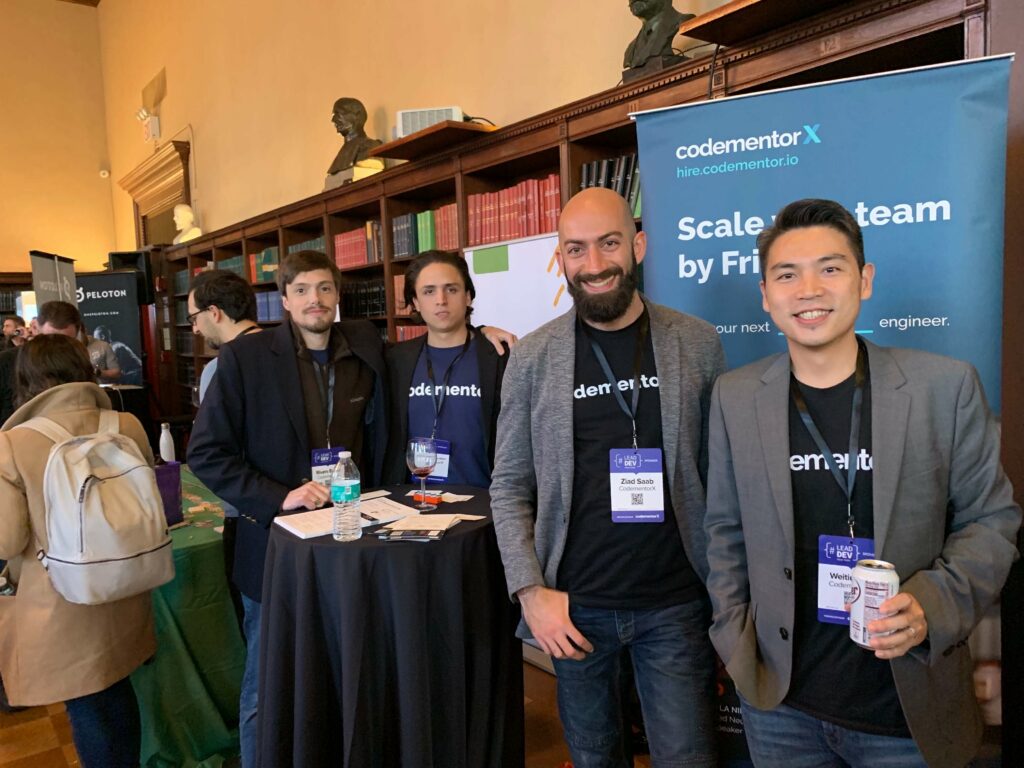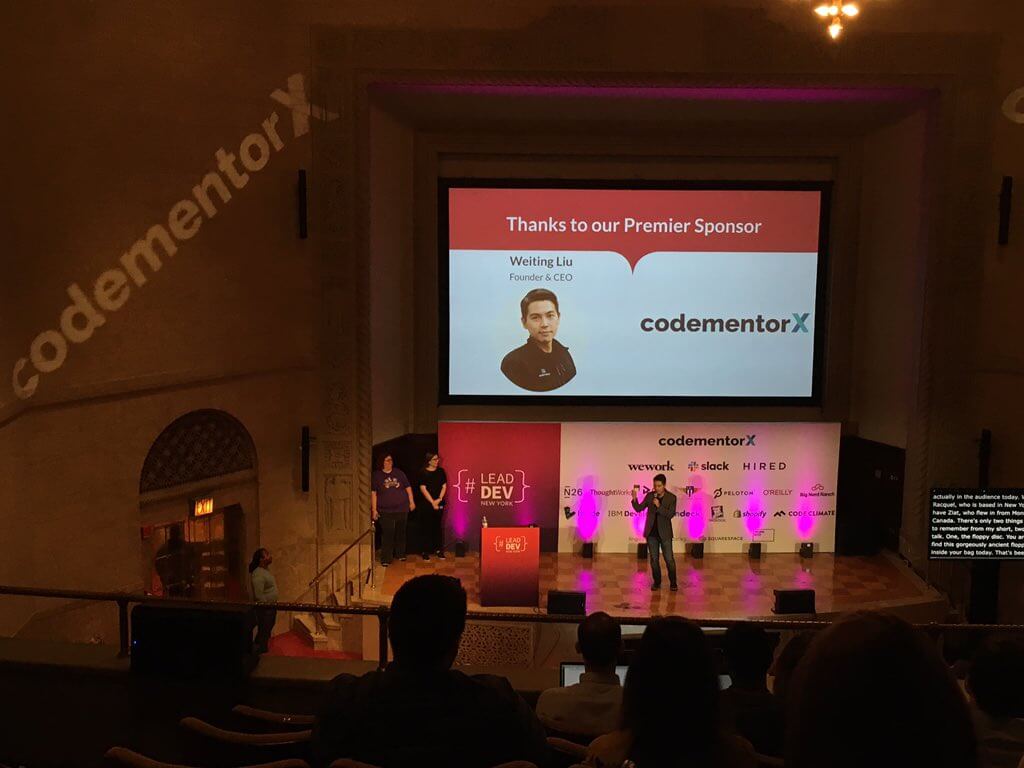A happy developer is a productive developer, whether remote or in a physical office. This was a common theme we heard throughout several talks at the Lead Dev conference where we just returned from.
With over 500 tech leads in attendance, Lead Dev truly is the conference for engineering managers and leaders. We listened to great stories from companies like Shopify, Mailchimp, Dropbox, Squarespace, and Meetup. It was also great to see some familiar faces, like Julia Grace from Slack, who also spoke at the SFELC conference earlier this year.
Of all the stories we heard that day, the one that resonated the most with us was from Nassim Kammah, Engineering Manager of Mailchimp. He shared how “remote-first teams work better”, which hits close to home for us since our team is a hybrid of both remote and non-remote team members. And he shared this on the same week that Stripe announced their fifth engineering team would be remote.
But before we jump into the advantages of remote-first teams and how to make them work, here’s a short video of a day in the life of remote developers at Arc (previously CodementorX):
Looking to hire the best remote talent? See how Arc can help you:
⚡️ Find the world’s top developers, designers, and marketers
⚡️ Hire 4x faster with fully vetted candidates
⚡️ Save up to 58% with global hires
Hire top talent with Arc risk-free →
Remotes == Friction
Nassim shared how businesses essentially choose one of three options when it comes to working with remote employees (aka “remotes”):
- Give up on remote
- Go all remote
- Remote-first collaboration
He firmly believes that remote-first teams are more productive, and he addresses how teams can reduce the common obstacles when working with remotes, namely meetings, enabling deep work, and maintaining common ground. We’ll go more into detail about each in the following sections.
Making Meetings Better
Impromptu meetings are often seen as something that’s difficult to replicate when some or all of your team is remote. For co-located teams, when you need to discuss something with another developer, it’s easy to walk over to their desk and get that out of the way. Although this can be seen as a time-effective approach, Nassim asks, “What if co-located teams are just hiding latent collaboration issues?”
In this scenario, what often happens is that there are “no rules” for who talks, in what order, and for how long. He says that the first person to talk usually gets the floor, and this caucus meeting style rewards those who “jump in.” This becomes a bigger issue if the team decides to hire remote team members, and these members may not be included in the spontaneous conversations, or find it hard to jump in and share their thoughts when they may be the only one who is remote.
Nassim says that meetings should be inclusive. A better approach would be to designate a moderator who facilitates who speaks when and in what order. For teams with remote members like Mailchimp, their ground rule is that everyone should be dialed-in to the call (including co-located people, if any) and be able to see each attendee. This helps create a space in which everyone can really listen to each other, read each others’ body language, and feel included.
Read More: 14 Essential Work From Home Tips for a Successful Remote Experience
Enabling Deep Work
“We spend our time communicating about work.” — Cal Newport
Whether your team is co-located or not, this probably rings true, and is much more apparent if you have remote team members in different time zones. Nassim compares Slack conversations to conveyor belts that “roll on by with or without you,” so each morning when someone checks Slack, they’re probably wondering what messages are or aren’t relevant to them. Similarly, throughout the week, several hundred Slack messages are sent (or even 1,000 a day for power users), which makes deep work difficult.
The key is to really help developers reduce distractions so they can be more productive, and ultimately, happier. If you’re an engineering manager, you really want to steer away from something like this:
To do this, Nassim recommends implementing “quiet hours.” That is, a set time each day or week in which there should not be any conversations in Slack, aka a time that Slack can be turned off. This encourages deep work and “avoids FOMO.” For teams with remote members, quiet hours can be set to work at the most optimal time for everyone.
Of course, he notes that there are other ways to do this, but the key is setting clear expectations for your developers about communication without leaving room for assumptions.
You can also try Arc, your shortcut to the world’s best remote talent:
⚡️ Access 350,000 top developers, designers, and marketers
⚡️ Vetted and ready to interview
⚡️ Freelance or full-time
Try Arc and hire top talent now →
Maintaining Common Ground
Nassim says that common ground is a set of pertinent shared knowledge, mutual beliefs, and mutual assumptions, which allows teams to operate effectively and fast.
It can be easy to lose common ground though. Sometimes, important information gets overlooked because someone was out of the office or unintentionally glossed over. That’s why it’s important to optimize for maintaining common ground within your team.
His approach to this includes installing the Reacji channeler app on Slack. This tool “allows your team to swiftly, seamlessly copy a message from one channel into another.”
After setting up the app, then it’s just a matter of doing the following:
- Identify common ground
- Summarize it and its context
- “Reacji” the message
“It’s a game-changer for PTO catch-up”, Nassim says, but this approach takes a lot of behavior modeling.
Read More: Remote Work Glossary: 50+ Words and Phrases on WFH & Virtual Careers
Happy Developers Need Happy Managers
Aside from maintaining a productive development team, engineering managers and tech leads are also responsible for the happiness and growth of their team. Whether it’s personal development for the current team or scaling the team to take on more projects, our team has been helping other teams with both, as our CEO Weiting Liu highlighted during his opening speech:
Your job shouldn’t be dominated by the challenge of scaling your team. Imagine a world where you have no hiring challenges. Arc can help you get there – by reducing the friction of hiring and working with remote developers.
Investing time in finding the right developer for your team can mean weeks or months of effort, and sometimes, you end up with no results, so that’s where we come in. With over 12,000 vetted developers, we help companies find great developers.
As Nassim said, “remote-first practices benefit everyone,” and our team believes that the future of work is remote. “Distributed teams are hard to pull off, but, when done well, they can be a competitive advantage,” says Anjuan, who also gave a great talk at the event.
We hope to encourage the engineering leaders of today to consider not-so-traditional approaches to hiring the best developers for their team. If you want to learn more about remote work or hiring/managing remote team members, be sure to subscribe to our newsletter!

Read More: How to Manage Distractions When Working From Home
In Closing
Lead Dev was the second physical conference we attended this year, and our team really enjoyed all the talks that day — both the speakers and attendees we spoke with at the conference and during happy hour. We highly encourage you to check out Lead Dev’s website as they will be releasing a recording for all the talks that day (for free)! You can also refer to these amazing sketchnotes.
We were also very excited to have the chance to meet up with one of our Arc developers, Ziad Saab, who biked from Canada to New York.


As always, we hope to see you at our next event!
You can also try Arc, your shortcut to the world’s best remote talent:
⚡️ Access 350,000 top developers, designers, and marketers
⚡️ Vetted and ready to interview
⚡️ Freelance or full-time









